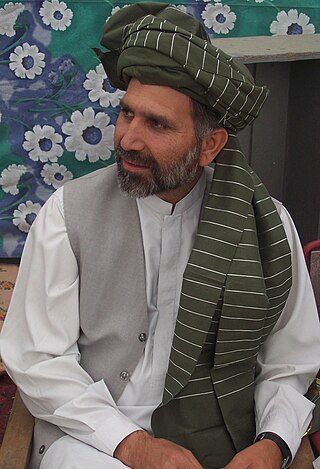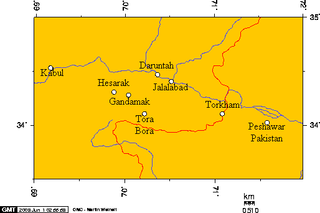
Jalalabad is the fifth-largest city of Afghanistan. It has a population of about 356,274, and serves as the capital of Nangarhar Province in the eastern part of the country, about 130 kilometres (80 mi) from the capital Kabul. Jalalabad is located at the junction of the Kabul River and the Kunar River in a plateau to the south of the Hindu Kush mountains. It is linked by the Kabul-Jalalabad Road to the west and Peshawar in Khyber Pakhtunkhwa, Pakistan, to the east through Torkham and the Khyber Pass.

Tora Bora is a cave complex, part of the Spin Ghar mountain range of eastern Afghanistan. It is situated in the Pachir Aw Agam District of Nangarhar, approximately 50 kilometres west of the Khyber Pass and 10 km (6 mi) north of the border of the Khyber Pakhtunkhwa province in Pakistan. Tora Bora and the surrounding Spin Ghar range had natural caverns formed by streams eating into the limestone, that had later been expanded into a CIA-financed complex built for the Afghan mujahideen. Tora Bora was known to be a stronghold location of the Afghan mujahideen, used by military forces against the Soviet Union during the 1980s.

Hezb-e Islami Khalis is an Afghan political ex-Mujahidin movement under Maulawi Khalis, who separated from Gulbuddin Hekmatyar's Hezb-e Islami and formed his own resistance group in 1979. The two parties were distinguished as Hezb-e Islami Gulbuddin and Hezb-e Islami Khalis, after the names of their respective leaders.

Mohammad Yunus Khalis was a mujahideen commander in Afghanistan during the Soviet–Afghan War. His party was called Hezb-i-Islami, the same as Gulbuddin Hekmatyar's party. The two are commonly differentiated as Hezb-e Islami Khalis and Hezb-e-Islami Gulbuddin.

Haji Abdul Qadeer was a prominent Northern Alliance leader in Afghanistan and opposed the Taliban. Originally a commander of the Hezb-i Islami Khalis faction during the Soviet–Afghan War, he then served as governor of Nangarhar Province, the head of the Eastern Afghanistan Shura, and later Vice President of Afghanistan and Minister of Public Works in the administration of Hamid Karzai from 19 June 2002 until his assassination on 6 July 2002. He was the older brother of fellow anti-Soviet and Northern Alliance commander Abdul Haq, who was executed in late 2001 by the Taliban.
Hajji Mohammed Zaman was a Pashtun Afghan military leader and politician. He was an ethnic Pashtun, connected to the Khogyani tribe. According to Maj. Dalton Fury, who fought together with Ghamsharik in November/December 2001 in the Tora Bora campaign against the Taliban, Haji Zaman had been "one of the more infamous mujahideen junior commanders during the Soviet–Afghan War. When the Taliban took over, Zaman departed Afghanistan for France. When the Taliban fell from grace after 9/11, he returned to his homeland to reclaim his former VIP status. He was said to have influential friends within neighboring Pakistan, including members of the Pakistan intelligence service. He reportedly led a force of 4,000 men during the campaign to oust Afghanistan's Soviet occupiers.

Abdul Haq was an Afghan mujahideen commander who fought against the Soviet-backed People's Democratic Party of Afghanistan, the de facto Afghan government in the 1980s. He was killed by the Taliban in October 2001 while trying to create a popular uprising against the Taliban in Afghanistan in the wake of the September 11th attacks.

Pachir Aw Agam, or Pachir Wa Agam, is a district in the southeast of Nangarhar Province, Afghanistan, bordering Pakistan. Its population, which is 100% Pashtun, was estimated at 39,280 in 2002, of whom 15,700 were children under 12. The district is within the heartland of the Khogyani tribe of Pashtuns. The district centre is the village of Pachir Aw Agam.
Gulan was an anti-Taliban militia leader, prior to the ouster of the Taliban. He was a member of a local anti-Taliban provisional administration that rose to power in Eastern Afghanistan, centred in Jalalabad, Nangarhar, before Hamid Karzai had assembled his nationwide provisional administration.

Mohammed Abdul Kabir is a senior member of the Taliban leadership who has served as the acting third deputy prime minister for political affairs of Afghanistan since 4 October 2021. He previously was the acting prime minister of Afghanistan from 16 April 2001 to 13 November 2001.
Hazrat Ali is an Afghan politician and former military leader. He previously served as a military commander for the Northern Alliance in eastern Afghanistan.
Hajji Din Mohammad also known as Azizullah Din Mohammad is a politician in Afghanistan who served as the Governor of Nangarhar Province followed by Governor of Kabul Province. He is currently the Chairman of Peace and Development Islamic Party. He has been involved in the peace and reconciliation process between the Afghan Government and the Taliban and is currently the deputy of High Council for National Reconciliation. Haji Din Mohammad comes from a distinguished Pashtun family "Arsala" The Arsala family is part of the Jabar Khel. He is also the elder brother of late Hajji Abdul Qadir and Abdul Haq His great-grandfather, Wazir Arsala Khan, served as Foreign Minister of Afghanistan in 1869. One of Arsala Khan's descendants, Taj Mohammad Khan, was a general at the Battle of Maiwand. Another descendant, Abdul Jabbar Khan, was Afghanistan’s first Ambassador to Russia.
Regional and tribal Afghan leaders rose up and formed an alliance known as the Eastern Shura to oust the Taliban in Khowst Province and Nangarhar Province, during the War in Afghanistan. Mary Anne Weaver, writing in The New York Times on the fourth anniversary of al Qaeda's attacks on September 11, 2001, described the formation of the Eastern Shura as the result of surrender negotiations on November 13, 2001, between Mohammad Yunus Khalis and Osama bin Laden.

Haji Nasrullah Baryalai Arsalai is an Afghan politician, who was a candidate during Afghanistan's 2009 Presidential election.
Anwar ul Haq Mujahid is the son of deceased Afghan militant leader Mohammed Yunis Khalis, founder of the Hezb-e Islami Khalis. When Khalis died in 2006 his son took over the organization, but later transitioned to the Tora Bora Military Front. He was thought to have been arrested by the ISI during a raid in Peshawar in June 2009 and was released from internment later in 2012. On 22 August 2016 one of Taliban's spokesman, Zabiullah Mujahid, announced that Anwar ul Haq had pledged allegiance to the new Taliban emir, Hibatullah Akhundzada.
Wazir Arsala Khan was an early ancestor of the influential Arsala family of Nangarhar Province, Afghanistan. Wazir Arsala Khan served as Foreign Minister of Afghanistan in 1869.
The Nangarhar offensive was a 21-day military offensive in February and March 2016, carried out by the Afghan government against the Islamic State of Iraq and the Levant – Khorasan Province (ISIS–K), with the assistance of ISAF and U.S airstrikes. When the offensive ended, ISIS had reportedly lost all of its territory in Afghanistan and had been expelled from the country.

The Battle of Tora Bora in June 2017 was a military engagement for the cave complex of Tora Bora and its surroundings in Afghanistan. Fighting took place between the Islamic State of Iraq and the Levant – Khorasan Province (ISIS–K) and forces opposed to it, namely the Taliban, militias formed by the population of the Pachir Aw Agam District, and the Afghan National Army. After heavy clashes ISIS–K forces initially succeeded in capturing Tora Bora from the Taliban on 13–14 June 2017, but Afghan government forces retook the cave complex by 17 June.

The Islamic State–Taliban conflict is an ongoing armed conflict between the Islamic State and the Taliban in Afghanistan. The conflict escalated when militants who were affiliated with Islamic State – Khorasan Province killed Abdul Ghani, a senior Taliban commander in Logar province on 2 February 2015. Since then, the Taliban and IS-KP have engaged in clashes over the control of territory, mostly in eastern Afghanistan, but clashes have also occurred between the Taliban and IS-KP cells which are located in the north-west and south-west.
Mawlawi Matiul Haq Khalis is the Afghan Taliban leader and President of the Afghan Red Crescent Society












